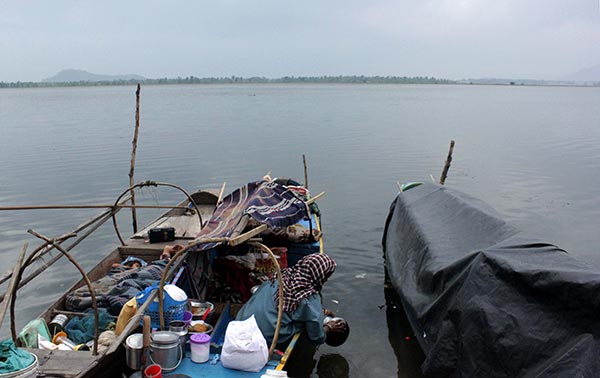Fishers of Dal Lake begin their day when the world around them retires to sleep. Once done with nocturnal activity, they bring home a net-full of fish before hitting the market, reports Durdana Bhat
 This scene starts right after sundown, when birds fly towards home. The fishers of Dal Lake row their boats on the water. At boundary of the lake, they stop their boats; and cast their nets into the water and then till dawn they wait, until fishes are netted.
This scene starts right after sundown, when birds fly towards home. The fishers of Dal Lake row their boats on the water. At boundary of the lake, they stop their boats; and cast their nets into the water and then till dawn they wait, until fishes are netted.
These fishermen move to catch fish right after the dusk from underneath the wooden bridge, build onto one end of Dal Lake’s periphery. It is a way towards that closure where people live in makeshift tents made at the end of the lake. These people lose the track of time as they remain busy in earning their living. It’s all contrary to them; they work when everyone around them retires to sleep.
Ghulam Ahmad Dar was sleeping in his boat, when he suddenly woke up when this reporter approached him. It was afternoon, weather was sunny. Chirping of birds was competing with rowing of boats.
At 65, Dar is displaying a boyish enthusiasm while carrying his netting activity. He has been displaying the same verve from last fifty-five years by carrying out this ancestral task, religiously.
Soon when Dar, the fisherman, was up, he grabbed his hubble-bubble and started puffing.
“I do fishing all over the Dal Lake,” he said, grasping for breath amid smoke. “But,” he interjected and paused. “I am not doing it against the law, as many people believe.” Another pause. A big drag of puff ensued. And then he hastened to add, “I renewed my fishing license last month, fiftieth time.”
But Dar isn’t a solitary fisherman in Dal Lake netting its prized possessions. Around 650 fishermen residing in a number of hamlets strewn along the periphery of the lake are in the same line of living.
“At around 7:30 pm,” Dar continued, “I move towards the Dal Lake, throw my fishing-net into the water.”
For the whole night, he said, he waits and sleeps in the boat. By dawn, Dar, like others, pulls out his net-full of fishes.
“Then it is all about luck,” he said. “Sometime we take out three to seven kilograms of fishes or sometimes only one. And there are times, when we have to return empty-handed.”
As fishers take out a basket-full of fishes from the lake, their wives then venture into markets with baskets atop their head to make living. Like others, Dar’s wife wanders from one market to another to sell fish.
Unlike Dar’s wife, however, there are many fisherwomen in the market who buys the imported fish stock early morning before step into the street, like Zoona.
In a typical traditional outfit, Zoona wanders from one village to other to sell the imported fish, which she buys from the vendor in Srinagar. She is selling fish from last twenty-five years.
“My husband was a fisherman who died in an accident, fifteen years back,” she said. “He used to catch fish for me and sell them in the market. But now, I buy imported fish from the vendors, 5 kilogram for Rs 1000 and sell them to Kashmir households. There is very less profit in it. It is very difficult to survive. I have to feed my daughters…”
Back in Dal Lake, JK government’s Fisheries department is keeping close tap on fishers. They check their license and are supposedly there to prevent illegal fishing. The department has divided the Dal Lake into three major parts—Hazratbal, Nishat and Nehru Park—housing a number of hamlets, where the fishermen reside.
Fishers usually take out carp fish species from the lake, introduced into the water body in 1957. As a result, the fisheries department said, carp constitutes 70 percent of all the fish in Dal Lake, while the Schizothonax constitutes 20 percent and other species account for remaining 10 percent.
Towards the sundown, a swarm of fishers started threading the bridge to reach Dal Lake. One among them was Gulzar Ahmad Dar, who was stopped midway by his wife, Rafika, for he had forgotten to take his dinner along. Rafika also sells fishes in the local market.
“I catch three to four kilograms of fishes usually,” Gulzar said. “But I can’t feed my family on that. You see, there are imported fishes in the market and now most of the people like to buy those fishes.” Rafika goes to the market to sell them but she often faces police, he said, who stalls the street sale. “It really upsets us.”
And with, Gulzar rowed past the boats dotting the lake in dusk and spreading a sleepy yet compelling scene across the lake. It is in this dark vista, fishers begin their day.















